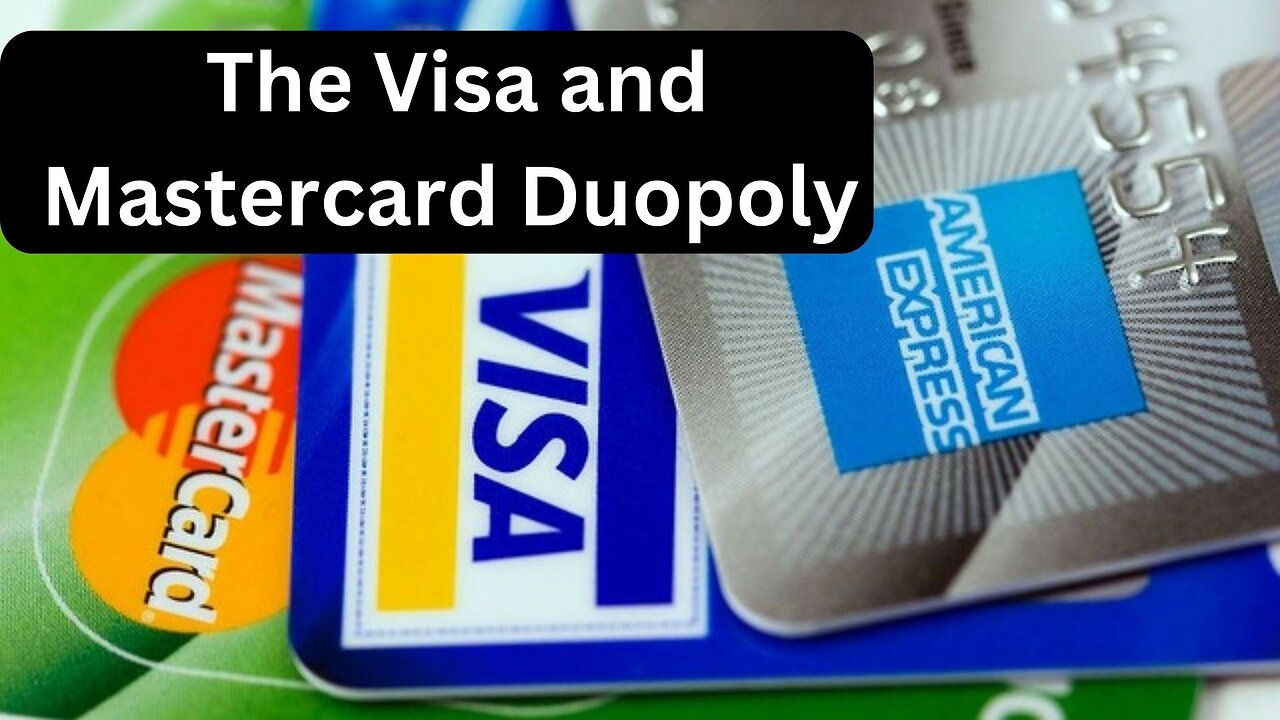Premium Only Content

The Visa and MasterCard Duopoly
The Visa and MasterCard Duopoly
Did you know that when you pay with your credit card, approximately 2% to 3% of that entire amount goes back to the bank that issued your card? This is called the interchange fee or swipe fee. Some of that money is paid out to cardholders in the form of rewards like cash back or airline miles. Another piece of the interchange fee is paid to payment networks like Visa and Mastercard.
Did you notice that I said “card issuing bank?” Visa and Mastercard to not issue cards directly to the public but Discover and American Express do. The card issuing bank actually issue the Visa and Mastercard credit cards to customers. Visa is larger than Mastercard in terms of transactions, purchase volume, and cards in circulation. It really doesn’t matter much whether you have Visa or Mastercard. What matters is the bank issuing the card. The bank determines interest rates, fees, and rewards. The only time it really does matter whether you have Visa or Mastercard is when you go to a merchant like Costco, that only accepts one and not the other.
The interchange fee helps compensate the card-issuing bank for various costs associated with providing credit card and debit card services such as fraud protection, customer service, and card issuance. Did you know you have more consumer protection with a credit card than a debt card? If you can be responsible with your credit card and pay off the balance, you should be doing all your transactions on your credit card rather than your debit card.
US merchants paid $93 billion in Visa and Mastercard credit card fees last year.
The companies have an operating profit of more than 50%.
The combined operating profit of Visa and Mastercard has grown 40x in less than two decades to more than $31 billion last year.
Most retailers have very slim profit margins. What people do not realize is that businesses expenses, whether they result from shoplifting, or in this case, credit card fees, are in turn based on to the consumer. However, most merchants will charge you the same amount whether you pay with a credit card or cash. Therefore, there is a transfer of money from people that pay with cash to people that pay with credit cards.
Visa and Mastercard have both announced they plan to increase fees paid by retailers.
Works Cited:
https://www.investopedia.com/articles/personal-finance/020215/visa-vs-mastercard-there-difference.asp
https://www.wsj.com/articles/the-credit-card-fees-merchants-hate-banks-love-and-consumers-pay-11592731800?mod=article_inline
https://www.wsj.com/finance/visa-mastercard-prepare-to-raise-credit-card-fees-ed779be1?utm_source=chartr&utm_medium=newsletter&utm_campaign=chartr_20230901
Tags:
interchange fees, interchange, interchange fees explained, visa interchange fees, interchange fee, interchange fees for credit cards, interchange fee (business operation), interchange rates, interchange plus, interchange plus pricing, what are interchange fees, how interchange fees work, interchange fees meaning, high visa interchange fees, mastercard interchange fees, credit card interchange fees, payment card interchange fees, interchange rate, credit cards, best credit cards, credit card, best credit cards 2023, best cash back credit cards, travel credit cards, cash back credit cards, credit cards for beginners, credit, best travel credit cards, credit score, top credit cards, credit cards 101, chase credit cards, best credit card, credit cards explained, best credit cards for beginners, best cash back credit cards 2023, credit card debt, 16 credit cards, credit cards 2023, 2022 credit cards
-
 3:46
3:46
The Last Capitalist in Chicago
1 year ago $0.06 earnedReturn to office policies are not working
199 -
 1:08:47
1:08:47
vivafrei
1 hour agoAnother "Trans" Mass Shooter? Rampage Jackson Keeps Digging? Democrats are Just Awful AND MORE!
3.39K9 -
 1:34:24
1:34:24
Redacted News
2 hours agoLIVE: Minnesota School Shooter’s Shocking Motive Revealed – Plus Trump Targets Soros w AG Ken Paxton
122K109 -
 4:55:15
4:55:15
StoneMountain64
5 hours agoHUNTING FOR THE FIRST WIN BACK ON WARZONE
45.5K2 -
 1:09:06
1:09:06
The Officer Tatum
3 hours agoBREAKING: Shooter IDENTIFIED TR*NS , Cracker Barrel CAVES To Pressure + MORE | EP 162
37K47 -
 53:47
53:47
Matt Kohrs
3 hours agoLIVE! Nvidia Earnings Call || NVDA Stock Reaction
18K1 -
 32:25
32:25
Tudor Dixon
1 hour agoKarol Markowicz on Freedom, Immigration, and Saving the American Dream | The Tudor Dixon Podcast
51 -
 2:03:25
2:03:25
The Quartering
5 hours agoFlag Burning, Free Speech, Church Attack & More With Andrew Wilson
187K297 -

The Robert Scott Bell Show
20 hours agoDr. Peter McCullough, Vaccines: Mythology, Ideology, and Reality, Dr. Dan Sullivan, Chiropractic - The RSB Show 8-27-25
18K -
 1:21:03
1:21:03
Darkhorse Podcast
5 hours agoFreedom, Tyranny, and Childhood Lost: The 291st Evolutionary Lens w/ Bret Weinstein & Heather Heying
34.2K17